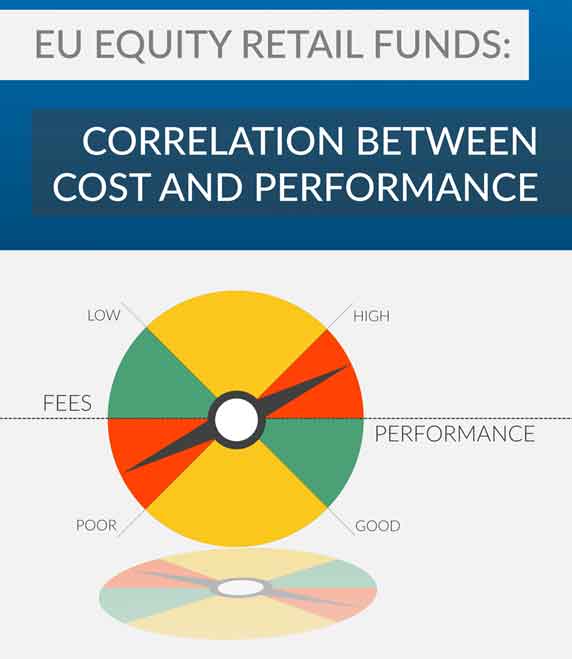Common knowledge has it that if you want to beat the market, you need to turn to highly active management … at a price.
As part of its #FundResearch series, BETTER FINANCE decided to put this notion to the test and take a closer look at the main factors impacting fund performance and the ability to deliver above-market returns, with a special focus on costs.
BETTER FINANCE measured the performance over the last ten years of EU equity retail funds from Belgium, France and Luxembourg in comparison with their benchmarks and found that only 27% of surviving funds with a sufficiently long track record managed to overperform the market over 5-year rolling quarterly periods[1]. This confirms that few active fund managers are able to offset the impact of the fees they charge and that it is mostly up to luck whether an investment will beat the market. It also establishes through very robust statistical evidence that the higher the fees, the fewer the active funds that manage to outperform (i.e. generating a positive “alpha”) their relevant capital markets’ returns.
|
Dispersion of excess return by fee brackets (Fees vs. alpha 2013 – 2017) |
||||
|
Fees |
Alpha |
All funds |
||
|
UCITS |
AIF |
Total |
||
|
[0%, 0.5%) |
alpha ≥ 0% |
1.86% |
1.18% |
1.80% |
|
alpha < 0% |
1.56% |
5.33% |
1.91% |
|
|
[0.5%, 1%) |
alpha ≥ 0% |
1.50% |
1.18% |
1.47% |
|
alpha < 0% |
5.05% |
8.28% |
5.34% |
|
|
[1%, 2%) |
alpha ≥ 0% |
16.16% |
4.73% |
15.10% |
|
alpha < 0% |
32.19% |
37.87% |
32.72% |
|
|
[2%; 3%) |
alpha ≥ 0% |
9.55% |
3.55% |
9.00% |
|
alpha < 0% |
22.28% |
23.08% |
22.36% |
|
|
[3%+ |
alpha ≥ 0% |
2.40% |
1.18% |
2.29% |
|
alpha < 0% |
7.45% |
13.61% |
8.02% |
|
Fees are nearly single-handedly to blame for the disappointing returns of many actively managed funds. A linear regression analysis confirms that, when fees increase by 100 basis points, the fund excess return decreases by 68 basis points. A multiple regression analysis establishes the predominance of the market return on overall fund returns, whereas the level of fees is the second most important return factor followed by the tracking error. What’s more is that occasional overperformance seems to be down to luck, with no causal link to fees or stock-picking skills, as no persistent outperformance could be discerned either.
Guillaume Prache, Managing Director of BETTER FINANCE underlines that “selecting a fund is a fundamental decision for an individual investor. Unfortunately, our research clearly shows that over the last ten years, up to 2017, the average investor only had a 1-to-3.7 chance of choosing an equity fund that would overperform its benchmark on any 5-year holding period. Low-cost equity index funds or directly held diversified portfolios of equities are therefore a valuable alternative option that should be offered to individual investors. The BETTER FINANCE research also firmly establishes the negative impact of the level of fund fees on excess return”.
STUDY ON THE CORRELATION BETWEEN COST AND PERFORMANCES IN EU EQUITY RETAIL FUNDS




